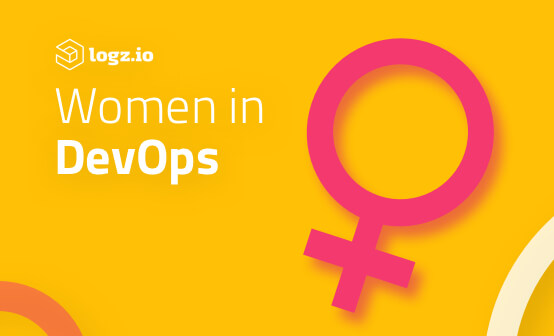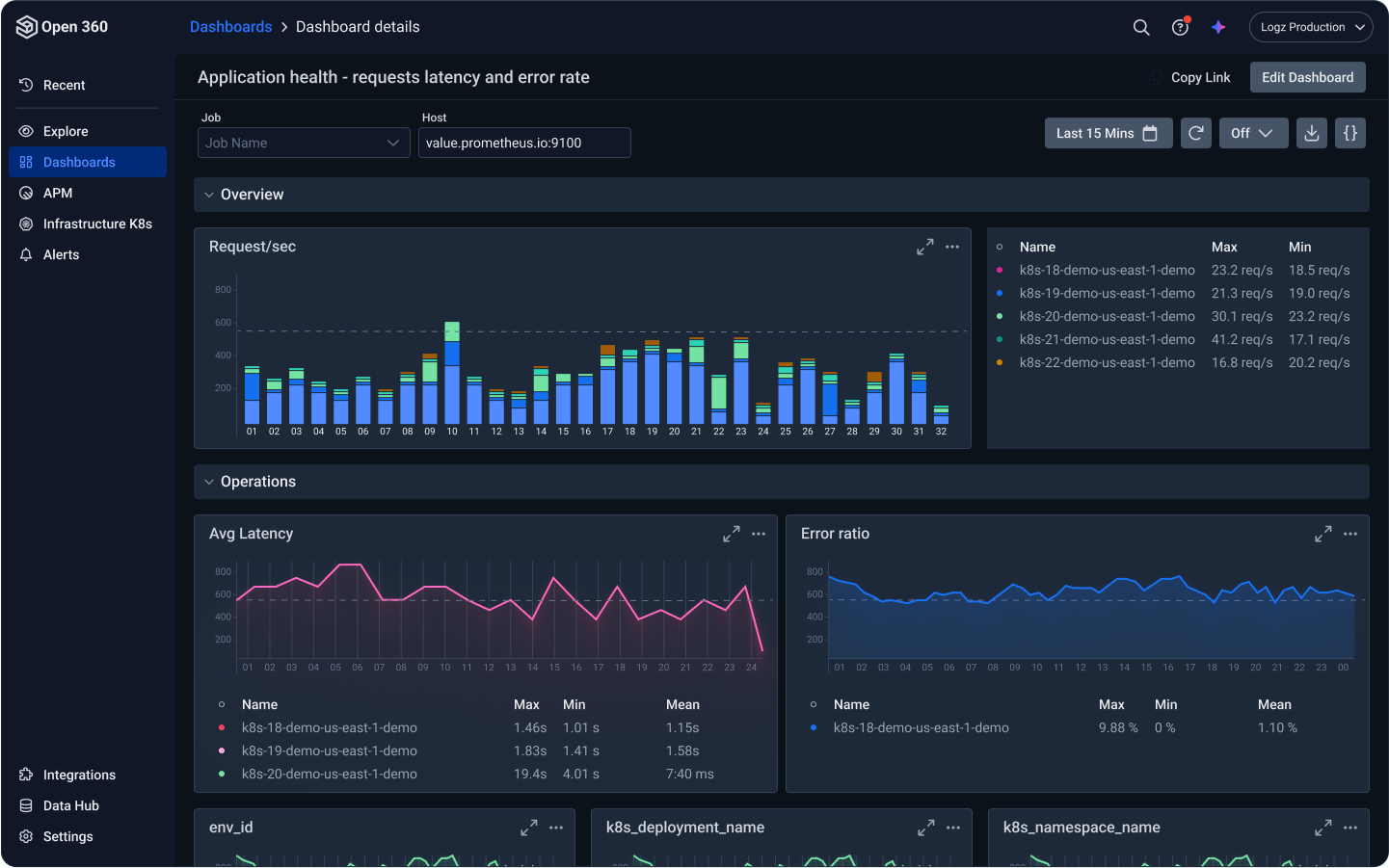
Why we Love DevOps: Thoughts from the Super Women of Logz.io’s DevOps Team
March 8, 2018

As a woman working in the tech industry for many years, albeit in marketing, I feel that International Women’s Day is especially important for those of us in this industry as it recognizes the talents and expertise of our female employees, while also taking time to examine how to make our workplaces more appealing to women and individuals of all backgrounds. Today, only 25% of computing jobs are held by women, a fact that should compel us to do more to attract and retain female talent.
Thankfully, at Logz.io, I have found a network of support and openness that can be difficult to find, especially when we examine the trends of the industry at large. So in honor of International Women’s Day, we’re putting the spotlight on two of Logz.io’s very own female superstars from the DevOps team, Shahar Gotshtat and Frida Gorovoy, who tell us what they love about their careers in DevOps and their thoughts on how to get more women on board:
 Shahar
Shahar
1. What inspired you to learn STEM and pursue a DevOps career?
I was always good at STEM as a kid, which led me to study mathematics in university and eventually, mathematics led me to programming. Later, when I worked for a three-person startup and for the first time had to perform DevOps related tasks, I realized these are the tasks I enjoyed the most. So when I was looking for my next challenge, I sought out a position where I could combine DevOps and backend skills, and that’s how I found my SRE position (site reliability engineer).
2. What do you love about working in DevOps? Which aspects of this career do you find most rewarding?
I love the way DevOps look at systems as a whole. We have to understand how everything works, not just the code we have written.
For me, the most rewarding aspect of this career is gaining a holistic comprehension and knowledge of various systems that is both deep and broad.
3. What positive/unique strengths do women generally bring to DevOps teams and what can organizations do to foster these qualities in team members?
I believe each person is unique and brings different strengths, regardless of their gender. For example, even if generally speaking women are better at time management, it doesn’t necessarily mean that every woman is better at it than every man.
4. Why do you think there are more men than women who go into this field and how can businesses/schools overcome this issue?
I believe we all have sexist prejudices about gender. That’s why men and women are treated very differently from the time they are babies, which causes most of the differences between men and women as adults.
One of the cultural differences we impose is what careers men and women are more likely to pursue. Tech in general and DevOps, in particular, is considered to be a very manly occupation.
Doing something that “belongs” to the opposite gender can be challenging, but it is also rewarding if it is something you enjoy. Because society doesn’t respond well to it, you might suffer unpleasant consequences.
But while being difficult, it also provides an opportunity to break barriers, become a better you, and encourage more women to pursue what they want.
5. In your opinion, what can the tech industry do to retain female employees from entry to executive level?
The tech industry can teach all executives and HR some gender studies in order to increase opportunities for women.
Most importantly, since our society still generally sees women as the primary caretakers of children (which should of course change, but it’s not in the hands of the tech industry), the tech industry can supply a more parent-friendly workspace.
6. What do you want to see change in the next few years to encourage more women to pursue STEM careers?
I want all children, regardless of their gender, to be taught that they are smart and talented, that their brain is more important than their looks, and that they can achieve anything. I want more female role models to be everywhere. I want teachers to encourage students to pursue STEM regardless of their gender.
7. Would you recommend your female friends pursue this career path?
Definitely. It is a very challenging, interesting and rewarding career.
8. What professional accomplishments are you most proud of?
I took a very non-traditional path to get where I am. I had to learn a lot and prove myself over and over again in order to have the opportunity to change my position – from QA engineer to a FullStack developer, to DevOps. Managing to improve my skills so that I can improve my position is what I’m most proud of.
Anything else you want to add on the topic of women in tech/DevOps?
Tech/DevOps jobs are dependant on brains and will, not on muscles, so women can be just as good at it as everyone else.
 Frida
Frida
1. What inspired you to learn STEM and pursue a DevOps career?
Truth be told, nothing in particular actually inspired me to learn STEM. Since I was little, my favorite past time was playing games, especially PC games. So because of the direct impact that computer performance has on the gaming experience, I dabbled in working with systems and learned some basic programming in school.
Then I got summoned to the army and passed some tests to get into a System Administrator course and decided to attend because it sounded interesting.
That’s what I did for my 3 years of service in the IDF’s IT unit. I learned most of what I know from there as well as from reading and exploring different areas that I enjoyed. After I finished my service, I decided to pursue a DevOps career because I found the role interests me since I enjoy learning how everything works and how to improve and fix various systems.
2. What do you love about working in DevOps? Which aspects of this career do you find most rewarding?
I really like learning about new products all the time and broadening my horizons. I enjoy getting very deep into how something works and knowing it well enough to make it work automatically, taking a load off everyone, so they will be able to focus on the things that they want to delve into.
I feel a sense of accomplishment when I find a problem and the solution to it, or when I refine things to make them work the best way possible. This industry is ever-changing and growing, so you never feel bored or that you already know everything. You can always try new strategies, and even failures are experiments that help you to make adjustments and improvements.
3. What positive/unique strengths do women generally bring to DevOps teams and what can organizations do to foster these qualities in team members?
I would say that woman can sometimes be perfectionists in their project management skills and therefore, want to carefully examine each project through and through.
I also think that women can bring different perspectives and ways of looking at things. A decision made by a man might not always be the same decision made by a woman. This means that there’s more diversity when debating, brainstorming and testing systems. Women may even feel they have to work harder because it’s a male-dominated industry and therefore, produce better results.
4. Why do you think there are more men than women who go into this field and how can businesses/schools overcome this issue?
I think that women often have less interaction with computers which might cause them to completely lack interest in them. I can probably say that since I grew up with two older brothers, I turned out differently than I may have if I would have had two older sisters.
Even now, I feel like there’s too much emphasis on women having to be a specific way since they were young, and needing to be more artsy and nurturing, which might cause them to go into fields that fit those tendencies more.
Maybe some women think they’re not good enough, despite the fact that it may interest them so they don’t even try. It’s still unusual to see women interested in fields, careers and hobbies that are considered male-dominant, so maybe they also feel intimidated and prefer to steer clear of them and pursue something they think would suit them more.
5. In your opinion, what can the tech industry do to retain female employees from entry to executive level?
If more women go into the tech industry, more women will probably enter executive positions. I could see this happening already in the army. More women are now taking on leadership roles and they are doing them well. I think this aspect depends more on the women themselves. If they want to pursue that position, unless they have obstacles that prevent them from doing so, they should and will.
Some of the women might not want to pursue leadership positions because they may feel like they will be looked down upon, but I think that shouldn’t be an issue anymore, and if they really want it enough to work hard and give it their all, they will succeed.
6. What do you want to see change in the next few years to encourage more women to pursue STEM careers?
Schools already give everyone the chance to study anything anyone is interested in so I think the main problem is the hesitation, uncertainty and disinterest. Maybe that will change if more women are encouraged to enter the field, or aren’t very dependant on the environment they grew up in.
7. Would you recommend your female friends pursue this career path?
If it interests them, then yes I would. I wouldn’t want women to enter the field only because females in tech are a minority and they feel like they should. I think it would only hurt them if it’s only for those reasons.
But if they like it, want to contribute, and feel like it’s their field, then I would completely recommend it. It’s fun and frustrating at the same time!
8. What professional accomplishments are you most proud of?
At this point, I can’t really say that I have professional accomplishments. I recently finished my army service and now I’m just doing my job and I am still learning.
I am proud of bringing about a bit of a change in how my previous unit in the army works. I wanted to go through my service in a way that made me feel like I made a difference by taking steps to make it a better, and more rewarding place to work.
This involved changing how people looked at things and trying to make people care more about one another as well as the work itself. Such initiatives were specifically intended for those that came after me. I think there are still a lot of areas to improve upon, but I can say I gave it my best.
9. Anything else you want to add on the topic of women in tech/DevOps?
The world is moving in the direction of “equal opportunity”, and there aren’t many remnants of old world views, so I’d say that this is a perfect time for everyone to do anything they want, men and women alike.
Concluding Thoughts
In honor of International Women’s Day, we at Logz.io would like to take this opportunity to celebrate the talent and professional contributions of our amazing female employees, with a special shout out to Shahar and Frida for giving their thoughts. In addition, thank you to all the women in the high tech industry whose capabilities and brilliance have lead to incredible innovation.
We hope that hearing a bit of first-hand insights from two of our own successful DevOps engineers will encourage female students contemplating this career path to envision a rewarding future in the industry.
Happy International Women’s Day!
 Shahar
Shahar Frida
Frida



